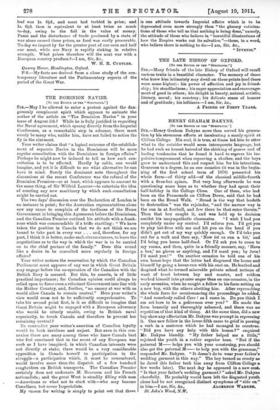THE DOMINION NAVIES.
[To THE EDITOR OP THE " SPECTLTOa.••1
Sin,—May I be allowed to enter a protest against the dan- gerously complacent spirit which appears to animate the author of the article on "The Dominion Navies" in your issue of August 5th ? While he is fully justified in regarding the Naval agreement, which sprang directly from the Imperial Conference, as a remarkable step in advance, there must surely be many who, unlike him, have not failed to notice the Sy in the ointment.
Your writer claims that " a logical outcome of the establish- ment of separate Navies in the Dominions will be more regular consultation with the Dominions in foreign affairs." Perhaps he might now be induced to tell us how such con- sultation is to be effected. Hardly by cable, one would imagine, and yet it is difficult to see what alternative he can have in mind. Surely the dominant note throughout the discussions at the recent Conference was the refusal of the Dominion Premiers—or at least, which appears to amount to the same thing, of Sir Wilfrid Laurier—to entertain the idea of creating any new machinery by which such consultation might be carried out.
The two days' discussion over the Declaration of London is an instance in point; for the Australian representatives alone saw any cause to complain of the tardiness of the Home Government in bringing this Agreement before the Dominions, and the Canadian Premier outlined his attitude with a frank- ness which was commendable if a trifle startling • " We have taken the position in Canada that we do not think we are bound to take part in every war . . . and, therefore, for my part, I think it is better, under such circumstances, to leave the negotiations as to the way in which the war is to be carried on to the chief partner of the family." Does this sound like a desire to be consulted more regularly in foreign affairs P Your writer notices the reservation by which the Canadian Parliament must approve of any war in which Great Britain may engage before the co-operation of the Canadian with the British Navy is assured. But this, he asserts, is of little practical importance ; for Canadian opinion could always be relied upon to force even a reluctant Government into line with the Mother Country, and, further, "no enemy at war with us would allow Canada to remain neutral." Here your writer's view would seem not to be sufficiently comprehensive. To take his second point first, is it so difficult to imagine that Great Britain might be engaged with a European adversary who would be utterly unable, owing to British naval superiority, to touch Canada and therefore to prevent her remaining neutral P To contradict your writer's assertion of Canadian loyalty would be both invidious and unjust. But even in this con- nexion there are many among those who know Canada best who feel convinced that in the event of any European war such as I have imagined, in which Canadian interests were not directly at stake, there would be a very considerable opposition in Canada herself to participation in the struggle—a participation which, it must be remembered, would involve more than the dispatch of a few hundred roughriders on British transports. The Canadian Premier certainly does not underrate M. Bourassa and his French nationalists ; and the great West is steadily filling with men —Americans or what not to start with—who may become Canadians, but never Imperialists.
My reason for writing is simply to point out that there is one attitude towards Imperial affairs which is to be deprecated even more strongly than "the gloomy vaticina- lions of those who tell us that nothing is being done," namely, the attitude of those who believe in " beautiful illustrations of how the Empire works out its salvation "—those, in a word, who believe there is nothing to do.—I am, Sir, &c., " Iuvams."


































 Previous page
Previous page